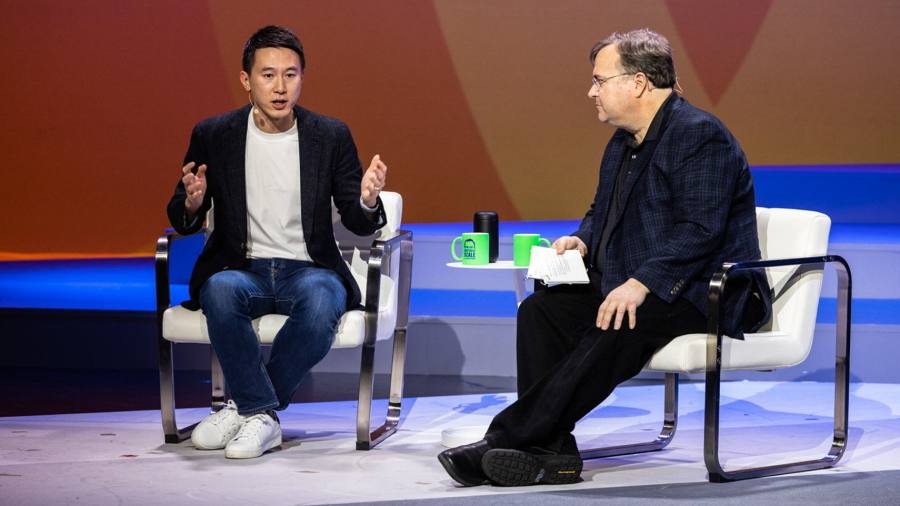
Mikumari Caiyhe, a spoken word artist, performs a poem inspired by how Slack “pivoted” from making a video game to building what would become a multibillion-dollar work communications platform. A tap dancer in gold shoes clacks across the stage.
“What do you do when it all goes wrong?” Caiyhe asks the 800-strong audience.
“Pivot!” they chant back.
“How do you win?”
“PIVOT!”
Later, the audience of mostly business founders and executives heard from a “plant medicine shaman” on the merits of psychedelics, a man creating a business class-only supersonic jet, and an elite performance coach.
Silicon Valley conferences are back, I guess. This was the Masters of Scale Summit in San Francisco’s Presidio, a gorgeous former military outpost overlooking the Golden Gate Bridge.
Fronted by Reid Hoffman, the creator of LinkedIn, the meeting attracted the chief executives of Microsoft, Uber, Airbnb and TikTok, as well as Bill Gates, former model Tyra Banks and film director Ron Howard. Prince Harry, as a last-minute surprise, talked about the mental strain of his “previous job” to promote his new one as chief impact officer for BetterUp, a business and wellness coaching company.
At times, it was like watching one of those sickly viral LinkedIn posts come to life. Here’s a personal, relatable, heart-wrenching story. And here’s what it means for your business. But a kinder interpretation might be that it offered a compelling pitch for what a conference must look like post-pandemic, as businesses question the expense of sending people to events when a livestream is available instead.
It was organised by WaitWhat, a media company set up by June Cohen and Deron Triff which also produces the Masters of Scale podcast that had inspired the event. Both are formerly of TED, the conference group responsible for whipping keynotes into tighter talks that prioritise the audience’s willingness to listen over the speaker’s desire to talk.
A similar reimagining is needed now, and this may well be it: convince people to travel by creating events that are as personally enriching as they are informational. “We wanted to create an event that allowed for authentic human connection between people,” said Cohen. It started with a hard rule: every speaker or panel guest had to be there in person. That meant turning down several “huge names” she said. “There’s almost nothing more compelling to humans than a really passionate human standing in front of them and sharing what they believe.”
It evidently worked. According to that unforgiving conference engagement metric — the number of laptops open or smartphones scrolled in sessions — it excelled.
Some habits die hard, though. Speakers were wrapped in cotton wool. Shou Chew, chief executive of TikTok, made a rare public appearance. A coup, but Hoffman failed to pose a single question on Chinese surveillance or political censorship. As a representative of the American internet user, he surely had an obligation to press harder. I asked Cohen if an agreement had been made with Chew, but she said no. And in the “The Human at the Center” session, Uber chief executive Dara Khosrowshahi received no follow-up to the statement that his “favourite” piece of leadership advice, from an unnamed mentor, was to quickly “fire someone”.
Yet, this isn’t the Silicon Valley of old. Arianna Huffington, negotiating her own “PIVOT!” from media to wellness, said we were witnessing executives reassessing their own states of mind as well as those of their staff. “Leaders have to be retrained,” she told me. “They need to have soft skills . . . which should no longer be called ‘soft’ skills.”
Indeed, if there’s one hopeful thing to take from the event, it’s that mental wellbeing seems to top the agenda for some of US business’s most powerful figures, after years of debilitating Silicon Valley “hustle culture”.
“It used to be how to hack your life to work more, sleep less, train more,” said Maëlle Gavet, chief executive of Techstars, a huge seed investor in start-ups globally. “Now people take pride in how many hours a night they sleep. That’s awesome.”